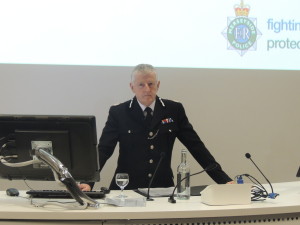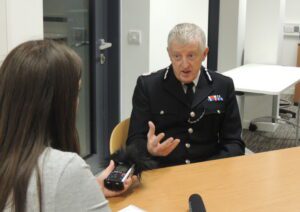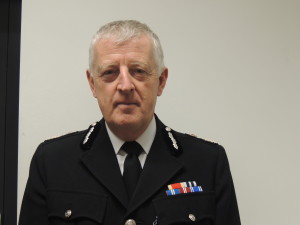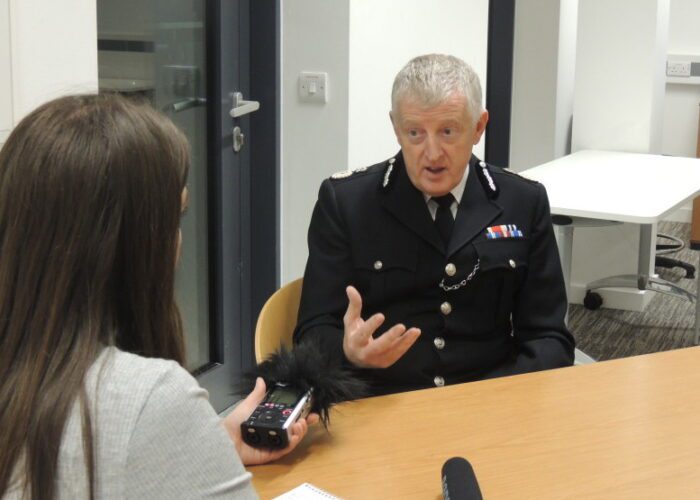
Merseyside’s most senior police officer gave a cautious welcome to the announcement that widely-expected budget cuts to his force did not materialise, as he provided his assessment of the current terrorism threat level following the Paris attacks.
Chief Constable Sir Jon Murphy spoke exclusively to JMU Journalism in the wake of the Government’s Spending Review announcement by Chancellor George Osborne that police budgets would be protected in real terms, including a 30% increase in counter-terrorism funding.
Sir Jon, who visited the Redmonds Building to give his third third annual lecture at Liverpool John Moores University, told JMU Journalism: “The events in Paris are so significant and have had such a catastrophic impact on the public in Paris.
“We are looking at the way we police the city and of course that is going on across the country. What we would like the public to do is to be aware, but not alarmed. There is no intelligence that there is a direct or indirect threat to Merseyside, or anywhere else in the UK at the moment.”
He described the Chancellor’s pledge to maintain police spending as “a great relief”, adding: “I have to utter a note of caution because until we get the detail from the Home Office, we still aren’t sure what this means. There is money that needs to be found. So whether we are top-sliced for that, which means we will lose money we weren’t expecting to, that is not clear.
“There is no money in the budget for pay awards or inflation. If everybody in the force received a 1% pay award over the next five years that is a total £9million. They only way we can finance that is to lose people. All of that has to be found but it is much better than we were expecting.”
The Merseyside Police Chief Constable discussed the future of neighbourhood policing as the main theme of his lecture at LJMU, explaining the importance of visibility in making the public feel safe.

He stressed that seeing a ‘bobby in a hat’ walk past a window makes the people of Merseyside feel reassured that, if ever they needed a police officer, they would not be far away. However, because of the loss of 1,600 officers and police staff since 2011 – with more cuts expected – he admitted visibility may not be something the force can continue to provide.
“The whole force has had to rearrange itself,” said Chief Constable Murphy. “At the moment we still have a visible presence in neighbourhoods but the cuts are making that harder to sustain.”
Sir Jon, who rose to the head of the local force in 2010, has an extensive career portfolio. He has worked alongside the FBI, earned the Fulbright Fellowship, and was on the frontline during the 1981 Toxteth riots after joining Merseyside Police as a cadet in 1975. He was knighted in 2014 in the Queen’s Birthday Honours.
Reflecting on the changing nature of the modern police force, Chief Constable Murphy said: “When I joined the police there was so notion of listening to communities. It was very much what I would describe as the ‘fire brigade’ police in the way the public would call, we would deal with the incident and then we would go away.
“There was no great notion of building community relationships, nurturing a neighbourhood or learning about the people that live there. It was very much a responsive style of policing. Neighbourhood policing isn’t like that. It’s about identifying and having a relationship with the community.”
According to the chief constable, the daily statistics for Merseyside Police include: 97 domestic violence cases, 100 ‘missing from home’ reports, managing 1,300 registered sex offenders, 117 crimes reported and 44 arrests.

When asked why less than half of reported crimes result in arrests, he replied there had to be a ‘necessity’ to arrest because of the limited resources and amount of work the force has to deal with. If there is no threat to security or to a witness, an arrest may not be considered necessary.
In an increasingly online world, Sir Jon spoke of the importance of needing bodies policing the ‘virtual neighbourhood’ that captures so many unsuspecting victims. He underlined that seeing an officer walking the streets would not offer protection to young people on their computers being groomed by a sex offender pretending to be a schoolboy, for example.
Additional reporting by Laura Gilchrist

